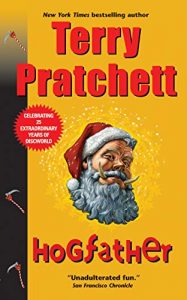 How did you see the world when you were a kid? Did you paint pictures where the sky was bluer than blue and didn’t meet the ground at the horizon? Did you believe in the Bogeyman, the Tooth Fairy, or Santa Claus? In Terry Pratchett’s Discworld series, not only are these things real, but belief is, for them, a literal matter of life or death. Hogfather, the 20th book in the series (out of 41!) is all about this belief–what it can do, and what happens when it goes away.
How did you see the world when you were a kid? Did you paint pictures where the sky was bluer than blue and didn’t meet the ground at the horizon? Did you believe in the Bogeyman, the Tooth Fairy, or Santa Claus? In Terry Pratchett’s Discworld series, not only are these things real, but belief is, for them, a literal matter of life or death. Hogfather, the 20th book in the series (out of 41!) is all about this belief–what it can do, and what happens when it goes away.
The Hogfather is the Discworld’s version of Santa Claus, a red-robed, jolly figure who travels around in a sleigh (pulled by pigs, not reindeer) and climbs down chimneys to deliver presents. He’s a beloved holiday icon, believed by children all across the Discworld, and yet someone–or rather, a group of powerful someones–wants him dead. They hire the services of the Assassins’ Guild, represented by the terrifying Mr. Teatime, to dispose of the Hogfather.
It turns out that when you get rid of someone believed in so strongly by so many people, you upset the balance of belief in the world and odd things start to happen. Now that the Hogfather is gone, there is a bunch of extra belief floating around, and new entities take advantage of this surplus to take physical form. We meet the god of hangovers, a creature that eats pencils, and one that steals socks, among others. Then there are the old gods who must learn new tricks. It’s Hogswatchnight, and someone needs to deliver the gifts. That someone is Death himself, and he has his own ideas about how the job should be done.
Pratchett’s characters and settings are delightfully fun, but the real magic of his work is in his sense of humor. In Hogfather, he pokes fun at aspects of the holiday season, and seems to be having fun doing so. The reader is treated to plenty of jabs at the commercialization of Hogswatch, a clear analogy for the consumerism of Christmas in our world. Some of Pratchett’s commentary goes beyond comedy and is, in fact, rather poignant. He has Death, in the guise of the Hogfather, rescue the Little Match Girl from the sad fate prescribed for her in Hans Christian Andersen’s fairy tale. THERE’S NO BETTER PRESENT THAN A FUTURE, Death says (in his signature all-caps dialogue), when asked why he changed the narrative. As the temporary Hogfather, he is supposed to uphold the holiday’s traditions, yet he never lets tradition get in the way of doing the right thing.
Underpinning the whole of Hogfather is the importance of belief. In the Discworld, belief is a tangible force, as real and physically-felt as gravity. When something tampers with the balance of belief, the whole universe feels it. It’s what makes the sun come up, after all. There is a scene towards the end of the book that spells this out beautifully. I won’t spoil it, but I will say that, for an anthropomorphic personification of a natural force, Death has an excellent grasp of what it means to be human.
According to the fan-made Discworld Wiki, Hogswatchnight falls on December 32. If you’re looking for a festive read, now is the time to pick up Hogfather. You can also check out some of Pratchett’s other novels at the Rutgers Libraries.